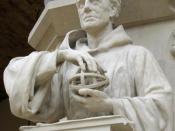The Renaissance, Reformation and Exploration eras altered medieval attitudes and institutions in many ways. First of all, the Renaissance marked the turning point of the new modern era. It was defined by its attention to the humanist culture, which was an educational and cultural program based on reviving works of Greek and Latin literature. Another attribute of the Renaissance was its greater focus to worldly activities than the medieval times, and also the theme of individualism. People took pride in showing off their unique talents, and sought after appreciation of their accomplishments.
Reformation influenced the rise of modernity in many ways. First of all, it destabilized the church, and divided Europe into Catholics and Protestants with major theological differences, which ended "medieval religious unity". Many people also wanted a more "genuine spirituality", which took many different forms. The number of increasingly educated middle class people along with creation of the printing press helped spread ideas through out Europe.
The longing for higher levels of religious education also came into demand, and along with that new versions of holy scriptures and writings. The reformation era emphasized the significance of the individual person, and stressed upon them their religious duties.
Exploration influenced the rise of modernity in many ways. First of all, the discovery of trade routes to East Asia and other places opened new doors of trading and commerce. As business and economic growth were at an all time high, a new form of central government began to emerge. This new government set laws for its surrounding lands opposed to the medieval times where churches determined state policy.
There were many differences between the middle ages and the rise of modernity. One was that many more works of restored ancient literature were back in circulation during the Renaissance period than the...



First of all.
You should alter the words you use in different parpagraphs.
0 out of 0 people found this comment useful.